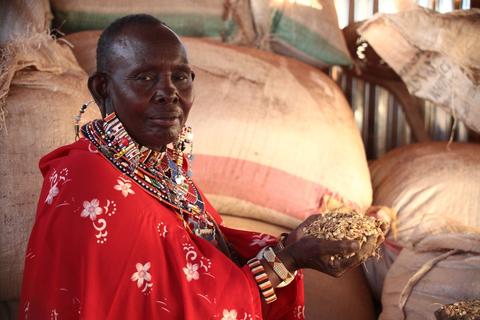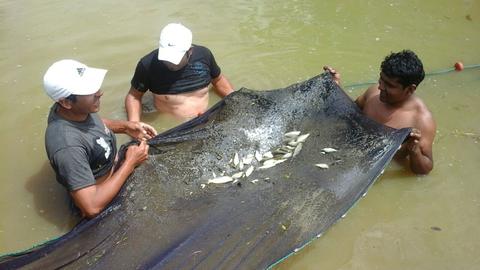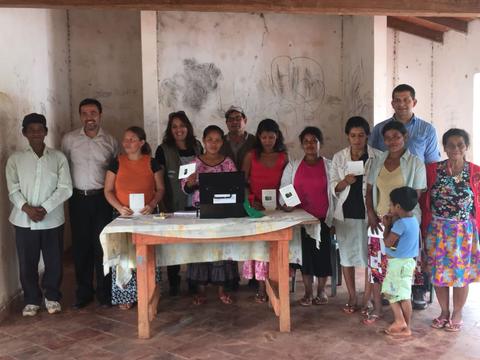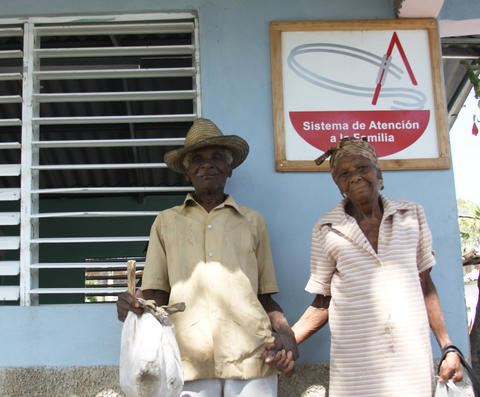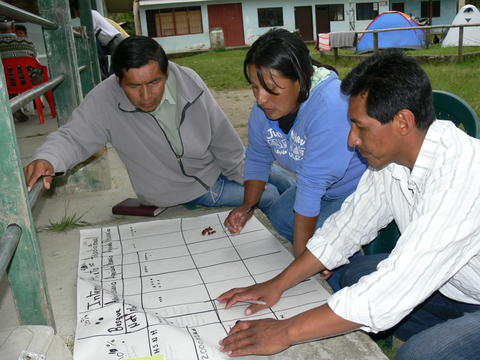September 15, 2016
Future Investments: 2030 Agenda for Sustainable DevelopmentCreative Commons
Christopher P. Skroupa: How can partnerships and collaboration help to ensure that the Agenda 2030 for Sustainable Development Goals (SDG) are realized?
Paloma Duran: The SDGs were developed by member states, and then after a long and open public consultation between public and private actors from around the globe, ensuring that a mountain of new voices would both be heard and remain active throughout the process. That said, the real work began last year when the goals were officially adopted by member states at the UN. The 17 goals serve as a framework for alleviating poverty as well as some of the world’s most intractable issues. They provide a clear outlook and parameters to follow.
The Sustainable Development Goals Fund (SDG-F) is an international multi-donor and multi-agency development mechanism created in 2014 by UNDP, on behalf of the UN system, to support sustainable development activities through integrated and multidimensional joint programs. Our objective is to bring together UN agencies, national governments, academia, civil society and business to address the challenges of poverty. As part of the UN system (and working in more than 22 countries) we have continued to demonstrate the importance of partnerships across sectors to overcome these critical challenges.
Consider our varied programs linked to Goal 17, where the SDG Fund is working to ensure that public-private partnerships are cultivated. In Honduras, the SDG Fund is working with UN Agencies and the private sector to strengthen income-generating opportunities through the revitalization of the Lenca culture. We are working to develop more sustainable tourism and micro businesses, especially for women and young people. In Tanzania, the SDG Fund has partnered with the World Bank to construct a social protection system to better address some of the most difficult challenges facing the country. Since the issues linked to poverty are complex, we find that our joint programs must strive to be multidimensional, cross silos, and address other factors linked to improving livelihoods, such as reducing regulatory barriers or providing basic literacy training and access education.
Building a regionally specific sustainable program requires the expertise of other UN agencies and local private sector support. This unique collaboration also provides the much needed orientation, training and oversight for the program. Every community depends on collaboration between diverse enterprises and citizens—especially young people who hold the key to innovative thinking and building efficient solutions to social and environmental challenges.
Skroupa: What role does the private sector play in implementing the labor and human rights aspect of the UN SDGs?
Duran: The private sector is critical to the SDGs—without jobs, there is no real means of economic development. Job creation is a critical investment that the private sector can bring to the table for development. As part in parcel with this, the know-how and innovation that the private sector offers is necessary, as well as new technological capabilities, products and services that enhance people’s lives.
To better align public-private partnerships for sustainable development, the SDG Fund has established a Private Sector Advisory Group, formed by business leaders of major companies from various industries worldwide. With their input, these leaders are helping the SDG Fund build a roadmap for how public-private alliances can provide large-scale solutions for achieving the new SDGs. Its aim is to collaborate and discuss practical solutions pertaining to the common challenges of contemporary sustainability.
We know, for example, that many companies are interested in developing more inclusive business models, and many firms are also interested in deepening their commitment to their workforce. There is a growing realization that developing markets are also attractive markets, and, as such, the private sector can get involved in a number of ways by partnering with the SDG Fund, or in aligning CSR or philanthropic strategies with the SDGs.
It is encouraging to see how many of the firms we work with, as part of our private sector advisory board, have helped raise awareness of the SDGs along their supply chain and are able to generate innovative solutions in the areas where they work, which may include leveraging technology to meet the needs of new markets or even expanding skills-based volunteering among their employees.
Going forward, it’s important to make sure that companies respect fundamental human rights and understand international labor standards, this includes adhering to key aspects of the UN Charter and its values. Our collaborative programs are committed to ensuring all of our private sector partners work to maximize these shared ideals.
In many ways, we hope to simplify the engagement process as the SDG Fund provides a key entry point for companies looking to partner with the UN. We bring together a range of public and private partners as well as key UN agencies like the International Labour Organization (ILO), International Fund for Agricultural Development (IFAD), Food and Agriculture Organization (FAO) as well as the UN Global Compact among others within and outside the UN system.
Skroupa: What have been the greatest challenges in achieving sustainable development?
Duran: The challenges vary depending on the awareness of the needs of the global community. For instance, there are differing community and regional accommodations as well as variable environmental, social and economic challenges that are relevant to each city and rural area.
We know that cities in Africa may face different challenges compared to those in Brazil or Fiji, however, at the same time there are similar issues linked to climate change, scarcity of water and land use. If we understand these fundamental challenges, then policies and programs can be enacted to promote investment, alleviate bottlenecks in trade, support diversity, etc.
Additionally, it’s important to look at the whole ecosystem of stakeholders. We know that companies often look to government—and in many cases, their shareholders—when making decisions, yet more and more we are understanding that no single entity can take on the challenges of sustainability alone. Private enterprise must understand that they will benefit in the long-run if they build robust and healthy communities throughout the places they work. However they must go beyond that, and look to the cities and local areas where they have employees and customers, and build greater alignment in problem solving in these areas. The good news is that this is actually happening!
Companies, creative industries, universities, and UN agencies are coming together to look at problems collaboratively and devise shared mechanisms for problems such as food security, water scarcity, and job creation. The challenge will be for companies to understand the new SDGs, 169 targets and 230 indicators as a framework for developing and meeting the varied goals. In many cases, working to measure and achieve these goals will help companies see the intrinsic value of their work across sectors and in new parts of their business.
Companies, creative industries, universities, and UN agencies are coming together to look at problems collaboratively and devise shared mechanisms for problems such as food security, water scarcity, and job creation. The challenge will be for companies to understand the new SDGs, 169 targets and 230 indicators as a framework for developing and meeting the varied goals.
Skroupa: How can companies begin to overcome these challenges to manage risk in the labor and human rights-related supply chain practices?
Duran: We commissioned a novel report entitled “Business and the Sustainable Development Goals” with Harvard’s Kennedy School and Business Fights Poverty. It serves as a framework for action, providing clear insight for the private sector on how we can work together towards the Sustainable Development Goals, as well as pragmatic feedback on how the UN can overcome barriers when working with companies. In the past, UN agencies were less likely to invite the private sector into the development process, but it is clear that businesses want to be brought to the table, not just as donors, but as part of the upfront design and in co-creation of programs. We need to work harder at combining our complementary resources with ideas that interest the private sector in order to build collaborative programs.
As part of this report, we also took the time and culled best practices to create a collection of case examples and perspectives from the Private Sector Advisory Group which outlined how companies are working on development. In many cases, the lessons learned illustrated the diversity in how businesses are engaging in development through commercial and philanthropic interventions, with most leading companies using a different combinations of interventions at the same time.
Skroupa: How would you define success, and when will you know the UN SDGs are successful? Is there a finite trajectory?
Duran: The SDGs are a set of goals that have a 15-year time frame, however alleviating poverty, and all the underpinnings that surround it, will be an ongoing challenge for our lifetime. Measurement is key to ensuring that our programs are impactful and help the people we hope to help. We need to track outcomes and learn from best practices of what works, and what does not. For example, many social and environmental factors will determine if a program is successful, at the same time, there must be buy-in from all partners, this means all actors like government partners, NGO’s and the private sector.
For the SDG Fund, a key component is the open and transparent evaluation that we share with our partners. As a multi-donor trust fund, we invite all potential donors to review our projects in the field, while also offering the unique provision to match funds. This means that all of our programs are supported by both public and private donors that share a goal to advance sustainable development. For now, our programs focus on a number of thematic areas, including inclusive economic growth (job creation), food security and nutrition, and water and sanitation. In addition, we have discovered from our work in these program areas that we are making an impact in all 17 goals. We continue to measure our progress and learn from best practices, case studies and strong engagement with our partners. It’s an ongoing process with many steps, but if we are to eradicate poverty, we have to begin to break it down in these meaningful steps.
Skroupa: How does the SDG Fund plan to achieve long-term success?
Duran: In a perfect equation, success means that we would all live in a world with greater equity and parity. We would have communities where there would be no hunger and all children would have access to quality education and affordable and accessible healthcare. For us, long-term success is built on a foundation of strong partnerships and the continuation of engaging new actors in the development discussion.
We have worked with the recent Pritzker Prize winner, Alejandro Aravena to shed light on the important role of architecture in development. He is a master at reimagining low-cost housing and shaping urban areas to allow for more affordable dwellings. The notion of expanding populations of unprecedented urban growth and displaced people in the world, only exacerbates the issues linked to poverty.
We also enlisted the know-how of the famed Roca brother chefs to help us spotlight national strategies and programs to fight hunger and malnutrition. This is especially important when we realize that three-quarters of the affected poor and food-insecure people in the world depend on agriculture and natural resources for their livelihoods. As Goodwill Ambassadors, the brothers will advocate for better nutrition and food security to promote sustainable development and how food choices, or lack of choices, impact health and the environment
Recently, we launched an exciting Food Africa program in Nigeria that will focus on enhancing food security in rural areas to minimize food waste and offset the 50 to 70 percent of harvest that is often lost. This unique collaboration between the Sahara Group, the Roca brothers and the government of Nigeria will help tap into the unbridled know-how of some of the world’s best chefs to create a Center of Excellence and training facility to help farmers reduce post harvest loss. The program will create new jobs for young people in the food sector, championing the concept of local production and work, to ameliorate issues linked to better nutrition, agricultural techniques and basic food storage.
Long term, we hope to replicate this program around the globe, where there is strong interest from rural community groups and cooperatives, especially those linked to smallholder farmers who recognize the need to improve key components in the agricultural value chain. In Africa and Asia, we’ve seen the food waste firsthand; it’s unimaginable to allow poor supply chain management to continue to affect food security and basic nutrition for so many.
This interview was originally published on forbes.com, on 8 September 2016. Christopher P. Skroupa is the founder and CEO of Skytop Strategies, a global organizer of conferences.

